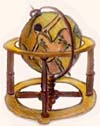 |
|
"she regards
sex and romance as on the whole more interesting than anything else. Fair enough, I guess."
 Three poems from Leaving and Leaving You by Sophie Hannah
 |
States of Affairs ___by Peter Howard Leaving and Leaving You by Sophie Hannah Carcanet Press, 1999 ISBN 1 85754 407 2 This is the third full-length collection by Hannah, and it shows no lessening of her fondness for and skill with form and rhyme. If anything, she's nailed her colours even more firmly to the mast: in her previous books, there were one or two poems that didn't rhyme. In this one, they all do. The forms she uses include traditional ones (sonnets, a villanelle, a rondeau redoublé) and a variety she's invented. Some of the invented ones are complex: Next Door Despised, for example consists of iambic sextains with successively two, five, three, two, three and five feet, and rhyming abccbb. Well, you try it. If you want to be as good as Hannah is at this game, make sure that your language is invariably up-to-date and conversational, with plenty of precise, economically drawn images. Oh, and while you're about it, make it a surreal poem that also manages to be frighteningly minatory. Difficult, isn't it? But Hannah makes it look easy. It's precisely because Hannah is so good with the formal aspects of her poetry that in a sense they become unimportant. It's like the frame of a picture - essential for holding the thing together, but not particularly noticeable in its own right. More important is the content, style and range of expression. The tone of the poems in this collection range from the playful to the harrowing. The book opens with Occupational Hazard, a teasing account of brushing off a would-be seducer: He has slept with the stupid and clever. But a mere two poems further on, we have Your Dad Did What? an emotionally searing account of a child's inability to articulate: and though this boy seems bright, that one is his. This is the most powerful poem in the book, and the least typical. Most of the others are concerned with romantic or sexual relationships, though there are a few about office politics and other concerns. This emphasis in Hannah's work is the one aspect I'd have preferred to see a bit less prominent. It's not that she can't write about other topics; I think it's just that she regards sex and romance as on the whole more interesting than anything else. Fair enough, I guess. But there are other things in the world to be concerned about, and I think some of them could benefit from the illumination of Hannah's poetry. Having said that, the treatment of various aspects of sexual attraction and romantic entanglement is perceptive and incisive. There is the gentle, wistful encounter with a cab driver in This Morning in a Black Jag, where the only love tokens exchanged are a progressive reduction in the fare charged, and an increase in the tip, and which ends with "...a train journey home to read and re-read the receipts he wrote." At the other end of several scales, there's the brilliantly contemptuously dismissive Reduced to Clear: "I wouldn't buy you from a car boot sale, // you or a size five shoe or books in braille - / I have no use for them." As the title suggests, many of the poems are concerned with departures of one sort or another, and modes of transport figure
largely in the book. There are trains, and the railway lines they run on, buses, cars, and the strange and strangely named
poem The Norbert Dentressangle Van which ends the collection. This is, I have it on the poet's own authority, "about weird surreal
things" but this by no means makes it either obscure or ineffective. The emotions conveyed by this poem are complex: even the
speaker doesn't know quite how they fit together, or whether they do fit together. This is a pretty common state of affairs for
most of us, one difficult to describe, but which Hannah manages to achieve convincingly.
|
||
